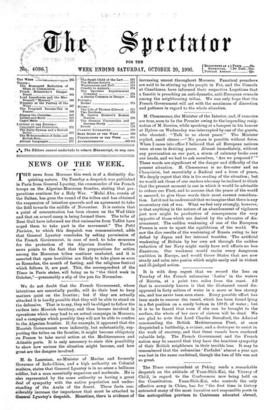M. Clemenceau, the Minister of the Interior, and, if rumours
are true, soon to be the Premier owing to the impending resig- nation of M. Sarrien, while speaking at a banquet in his honour at Hyeres on Wednesday was interrupted by one of the guests, who shouted : "Talk to us about peace." The Minister replied, amid cheers :—" No peace is possible without force. When I came into office I believed that all European nations were at one in desiring peace. Almost immediately, without any provocation on our part, a storm of calumny broke over our heads, and we had to ask ourselves, Are we prepared P" These words are significant of the danger and difficulty of the present situation. M. Clemenceau is no fire-eater and no Chauvinist, but essentially a Radical and a lover of peace. We deeply regret that this is his reading of the situation; but we would ask those of our readers who may be inclined to think that the present moment is one in which it would be advisable to reduce our Fleet, and to assume that the peace of the world is assured, to give these words their most earnest considera- tion. Let it not be understood that we imagine that there is any momentary risk of war. What we feel very strongly, however, is that anything in the nature of an abandonment of vigilance just now might be productive of consequences the very opposite of those which are desired by the advocates of dis- armament. The sudden weakening of one of the European Powers is sure to upset the equilibrium of the world. We saw the dire results of the weakening of Russia owing to her defeat by Japan and her internal troubles. The artificial weakening of Britain by her own act through the sudden reduction of her Navy might easily have evil effects no less disastrous. Our weakness would excite every dangerous ambition in Europe, and would throw States that are now steady and calm into panics which might easily end in violent and ill-judged action.














































